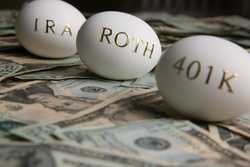Best Index Funds with Low Expense Ratios

Our evaluations and opinions are not influenced by our advertising relationships, but we may earn a commission from our partners’ links. This content is created by TIME Stamped, under TIME’s direction and produced in accordance with TIME’s editorial guidelines and overseen by TIME’s editorial staff. Learn more about it.
Index funds track a stock or bond market index and offer any easy way to build a diversified portfolio. The best index funds tend to be the lowest-cost funds. Indexing is also known as passive investing and does not involve analyzing and choosing individual stocks and bonds. The cost of managing an index fund is generally lower than for an actively managed fund.
Index funds come in two basic formats: mutual funds and ETFs. Both types of funds have their merits and the best option will depend on each investor’s situation and preferences. For example if you are investing through a 401(k) plan the only choice might be an index mutual fund.
Looking for a financial advisor? WiserAdvisor will help you find and compare top vetted financial advisors in your area.
Here are six of the best low cost index funds across several investment styles to consider.
| Fund | Expense Ratio | Minimum Investment |
|---|---|---|
Vanguard Total Stock Market Index Admiral (VTSAX) | 0.04% | $3,000 |
Vanguard Total World Stock ETF (VT) | 0.07% | NA |
Vanguard Total Bond Market ETF (BND) | 0.03% | NA |
Vanguard Mid Cap Index Admiral (VIMAX) | 0.05% | $3,000 |
SPDR S&P 500 ETF Trust (SPY) | 0.095% | NA |
iShares Core S&P Small-Cap ETF (IJR) | 0.06% | NA |
This fund is offered in several mutual fund share classes by Vanguard that vary in terms of the minimum initial investment and the expense ratio. The fund is also offered as an ETF—as are many of Vanguard’s index mutual funds.
The fund tracks the CRSP US Total Market Index, a proxy for the total U.S. stock market. The fund is a good option for investors looking for a passive index fund that tracks the total market. The index is market-cap weighted meaning the largest stocks in the index have a larger influence on the fund’s performance.
This fund offers global diversification in one ETF. The fund tracks the FTSE Global All Cap Index. This index includes stocks of all sizes and market capitalizations that are listed in developed and emerging-markets countries.
The index tracks over 9,000 stocks and is one of the least concentrated of major stock indexes. This fund is a good choice for an investor who wants broad representation across virtually global stock markets.
This fund tracks the Bloomberg US Aggregate Float Adjusted Index, an index that tracks fixed-rate, investment grade taxable U.S. bonds. The index captures much of the domestic bond market but does include certain classes of bonds such as inflation-linked bonds and some others.
This is a low-cost index ETF that offers investors an all-in-one way to track most of the U.S. bond market. As with all Vanguard ETFs, this is considered another share class of a mutual fund with the same configuration.
This fund tracks the CRSP U.S. Mid Cap Index, an index targeting stocks in the top 70% to 85% of the U.S. equity market in terms of market size. Mid-caps typically represent stocks in companies that have moved past the small cap stage and are companies with established balance sheets and internal systems.
Mid-caps can be a lucrative area to invest and offer a level of diversification away from domestic large caps. This fund comes in several share classes with varying minimums and expense ratios. There is also an ETF version of the fund.
This ETF offers a low cost option to track the S&P 500 index, a core index covering U.S. large cap stocks. This ETF can be a core holding in any portfolio. SPY was one of the first ETFs to be listed in the U.S. The fund is market-cap weighted, so larger holdings can have an outsized influence on the fund’s performance.
A fund like SPY can be a core holding in many portfolios. This ETF is widely traded with a negligible bid-ask spread which helps keep overall transaction costs low.
Small caps stocks can offer a high potential for growth. Most of today's market leading large cap stocks started out as small caps. There is also risk in small caps and some of these companies may fail or not pan out as hoped.
The ishares family of ETFs is offered by BlackRock, one of the largest ETF providers. IJR tracks the S&P SmallCap 600 index. S&P is one of the only index providers to have a profitability requirement for its size segmented indexes such as this one.
The first priority in choosing an index fund is understanding the fund’s underlying index and if this is a good place for you to invest. What asset class does the index fund represent and how does this fund fit into your overall investment strategy?
If considering a stock oriented index fund, you will want to look at things like:
In some cases a broad index fund like one that tracks the total U.S. stock market may be appropriate, in others you may want to create a diversified portfolio of index funds across asset classes and industry sectors.
It’s important to review the expense ratio of any index mutual fund or ETF that you are considering. Not all index funds are low cost. Compare the expense ratios of any index funds you are considering among funds tracking a similar index. Online brokers such as TradeStation and J.P. Morgan Self Directed Investing* can help you access and compare these funds in an efficient and user-friendly manner.
During and after COVID-19, index funds performed as well or as poorly as the underlying index the fund tracks. For example, 2022 was a rough year in the stock market and hence index funds tracking a stock market index such as the S&P 500 would have suffered. Index funds will be impacted by market and economic events just like any other type of mutual fund or ETF.
Investing is a long-term proposition, so now is as good or as bad of a time as any to buy index funds. If you are investing for the long-term, investing isn’t about trying to time the markets. Your choice of index funds and when to buy should be based on a long-term strategy.
Dollar-cost averaging into one or more low cost index funds can be an ideal way to build a diversified portfolio over time. This is how investing in a retirement plan like a 401(k) or 403(b) is done. Dollar-cost averaging allows you to purchase more shares when the price of the fund is down and fewer when it is up.
Regardless of market conditions, index funds offer a low cost way to invest. In all market conditions, but especially during a down market, lower costs provide an investing edge. If you are unsure about when and how to invest, it’s a good idea to invest in a financial advisor. WiserAdvisor can connect you to a local financial advisor who can help you sort out your finances, from investing and saving to taxes and retirement planning.
How to invest in an index fund can be confusing for some investors. The two main ways are by using an ETF or an index mutual fund. The latter is more common in an employer-sponsored retirement plan like a 401(k) or 403(b).
Many index funds are low cost, which helps enhance the returns on an investment in the fund. In recent years there have been a number of articles showing how many index funds have outperformed their actively managed mutual fund and ETF peers.
They are simple to understand and can enhance an investor’s ability to build a low cost, diversified portfolio.
While this might sound simplistic, the lower the expense ratio the better. There are some index funds with expense ratios of 0.05% or even lower. The lower the expense ratio, the less drag on net returns to the fund investor from expenses. When searching for an index fund it is a good idea to compare the expense ratios of index funds to determine if the one you are looking at is competitive in terms of its expense ratio.
Investing by its very nature involves risk. The index fund you choose may lose value when the market as a whole is down or when the particular type of investment tracked by the underlying index is down.
You can lose money with index funds, but they are no more or less risky than other investments just because they are index funds.
*INVESTMENT AND INSURANCE PRODUCTS ARE: NOT A DEPOSIT • NOT FDIC INSURED • NO BANK GUARANTEE • MAY LOSE VALUE
The information presented here is created by TIME Stamped and overseen by TIME editorial staff. To learn more, see our About Us page.



